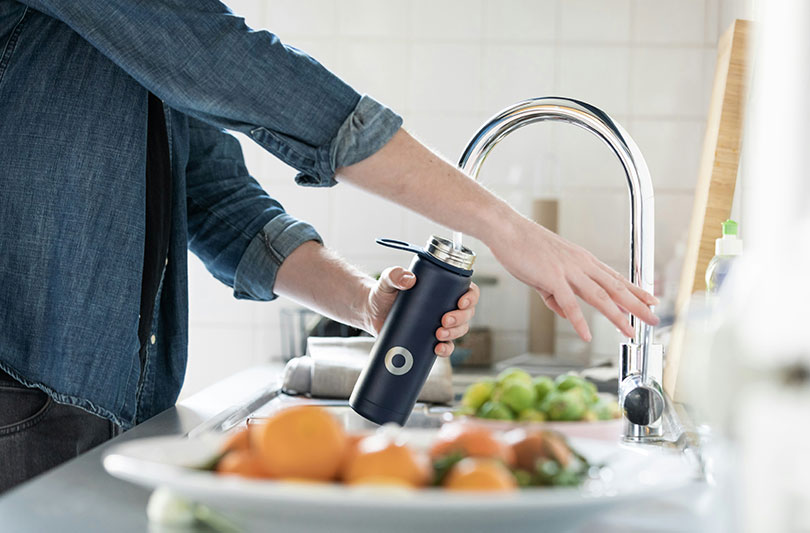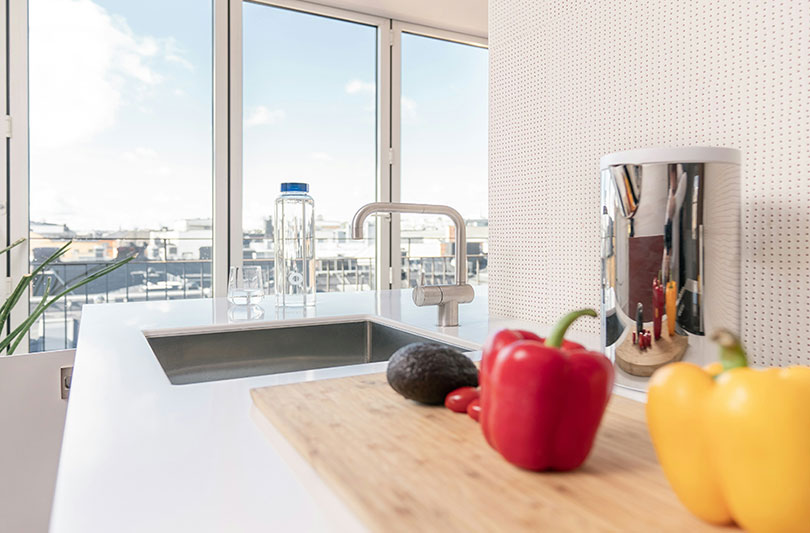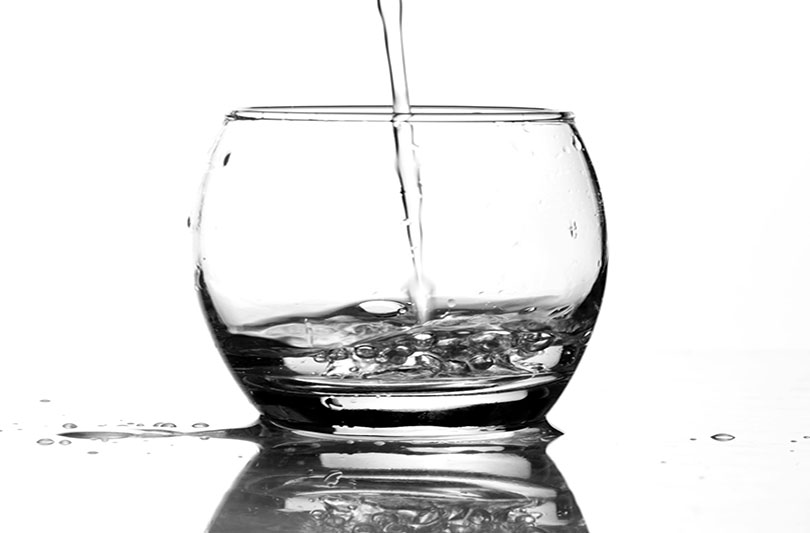Ever turned on your tap and wondered about what’s really in your water? You’re not alone. More UK homeowners are exploring water filtration options, with under sink and whole house filters being the two main contenders. This comprehensive guide will help you understand exactly what these systems offer, their differences, and how to choose the right one for your home.
The Real Difference Between Under Sink and Whole House Water Filters
Think of an under sink filter as your kitchen’s personal water purifier, while a whole house filter acts as your home’s main water guardian. But there’s much more to it than that.
Under sink filters work their magic right where you need clean water most – at your kitchen tap. They’re like having a mini water treatment plant hidden away under your sink, delivering clean, fresh-tasting water for drinking and cooking.
Whole house filters, meanwhile, are your first line of defence. They tackle water quality issues before water even reaches your taps, giving you filtered water from every outlet in your home. This means your morning shower, washing machine, and even your garden hose deliver filtered water.
How Each System Actually Works
Under Sink Filter Technology
Your under sink filter system typically consists of several key components working together:
The pre-filter catches larger particles like sand and rust, protecting the more sophisticated filters that follow. Next, activated carbon filters remove chlorine, organic compounds, and those unwanted tastes and odours that can make your water less appealing.
Some advanced systems might include:
- Ceramic filters for bacterial removal
- Carbon block technology for chemical reduction
- Reverse osmosis membranes for comprehensive filtration

Whole House Filter Systems
These systems use a different approach, focusing on treating larger volumes of water quickly and effectively. The process typically involves:
- Sediment filtration (multiple stages for progressively finer particle removal)
- Carbon filtration for chlorine and chemical reduction
- Optional specialised media for specific contaminants
The key difference is the flow rate – whole house systems need to handle much higher water volumes without creating pressure drops that could affect your daily water usage.
The Science of Water Filtration: What Actually Gets Removed?
Under Sink Filter Capabilities
Under sink filters excel at removing:
- Chlorine (typically 95-99% reduction)
- Lead and heavy metals
- Volatile organic compounds (VOCs)
- Parasites and cysts
- Pharmaceutical residues
- Bad tastes and odours
However, they can’t:
- Soften water (that’s a job for water softeners)
- Remove dissolved minerals
- Treat water throughout your home
Whole House Filter Performance
Whole house systems focus on:
- Sediment removal (down to 5 microns)
- Chlorine reduction (85-95%)
- Rust and sand filtration
- Some chemical contaminants
- General water clarity improvement
But they don’t:
- Filter as finely as under sink systems
- Remove as many contaminants
- Soften water

Real-World Performance: What to Actually Expect
Under Sink Systems in Daily Use
When you install an under sink water filter, you’ll notice immediate improvements in your drinking water quality. The most striking change is usually the taste – that chemical, chlorine flavour disappears, replaced by clean, fresh-tasting water. Your morning tea or coffee will taste notably better, and you’ll spot the difference in your ice cubes too, which become crystal clear.
There are, however, some practical considerations to bear in mind. You’ll need to keep track of filter replacement schedules, typically every six to twelve months, depending on your water usage. The system might slightly reduce your water flow rate, though this is rarely noticeable with modern systems. You’ll also need to allocate some space under your sink for the unit, and factor in occasional maintenance checks.
Living with a Whole House System
A whole house water filter transforms your entire home’s water supply. You’ll experience consistent water quality from every tap, whether you’re running a bath, washing vegetables, or filling the kettle. The reduction in chlorine is particularly noticeable during showers, where many people report softer-feeling water and less skin irritation.
The system also helps protect your appliances from sediment build-up, potentially extending their lifespan. However, it’s worth noting that this comprehensive coverage comes with higher upfront costs and requires professional installation. You’ll need to monitor whole house water pressure and schedule regular maintenance to keep the system running efficiently.
Installation Insights: What You Need to Know
Under Sink Filter Installation
Installing an under sink filter typically takes between one and two hours for a professional plumber. The process requires access to your under-sink plumbing and usually involves fitting a separate tap for filtered water. Your worktop might need modification to accommodate this new tap, but a skilled installer will ensure this is done neatly and professionally.
Space can sometimes be a challenge, particularly in older properties with unusual plumbing configurations. Water pressure needs careful consideration too, and some systems require specific drainage arrangements. However, these challenges are usually straightforward for an experienced installer to overcome.
Whole House Filter Installation
Whole house filter installation is a more complex undertaking that requires professional expertise. The process typically takes four to six hours and involves connecting to your main water supply line. Your installer will need to identify the best location for the system, considering factors like access for maintenance and proximity to drainage points.
The installation must comply with UK building regulations and involves careful consideration of your home’s water pressure requirements. The system needs proper sizing to handle your household’s water demand without creating pressure drops. This often includes installing a bypass valve for maintenance purposes and ensuring adequate clearance for filter changes.

Understanding the Costs
Under Sink Filter Investment
The financial commitment for an under sink system starts with the initial purchase, ranging from £150 for basic models to £450 for advanced systems with multiple filtration stages. Installation costs typically fall between £100 and £200, depending on your plumbing setup and whether you need a new tap fitted.
Ongoing costs remain relatively modest. You’ll need to budget for replacement filters, which cost between £30 and £60, typically needed every six to twelve months. Annual maintenance might cost £50 to £100 if you opt for professional servicing, though many homeowners handle basic maintenance themselves.
Whole House Filter Finances
Whole house filtration represents a more substantial investment. Basic systems start around £800, while advanced setups with multiple filtration stages can reach £2,500. Professional installation adds £300 to £600 to these costs, reflecting the complexity of the work involved.
The annual running costs include filter replacements (£100-£300) and professional servicing (£150-£250). While these costs might seem significant, they should be viewed in the context of protecting your entire home’s water supply and potentially extending the life of your appliances.
Maintaining Your Water Filter
Under Sink Filter Care
Proper maintenance ensures your under sink filter continues to deliver high-quality water. Regular cartridge replacement forms the cornerstone of maintenance, but you should also periodically check connections for leaks and monitor the system’s performance. If you notice reduced water flow, changes in taste or smell, or unusual noises, these typically indicate it’s time for maintenance.
Whole House Filter Maintenance
Whole house systems need regular attention to maintain optimal performance. This includes monitoring pressure gauges, checking for proper filtration, and scheduling annual professional inspections. You might notice warning signs like reduced water pressure throughout your home or changes in water clarity, which warrant immediate attention.

Making an Informed Choice
Your decision between an under sink and whole house filter should reflect your specific circumstances. Consider how you use water in your home – are you primarily concerned with drinking water quality, or do you want filtered water for bathing and appliances too? Think about your property type – whether you own or rent can influence your choice, as can available space and your current plumbing setup.
Budget naturally plays a crucial role, both in terms of initial investment and ongoing maintenance costs. Consider not just what you can afford now, but also the long-term running costs of each system.
Our Professional Support
At Hart Water, we pride ourselves on guiding customers through every step of the water filtration journey. We begin with a thorough water quality assessment, followed by detailed recommendations based on your specific needs and circumstances. Our installation service ensures your system is properly fitted and optimised for your home, while our ongoing support keeps it running efficiently for years to come.
Next Steps
Improving your water quality starts with understanding your options. We offer free consultations to help you make an informed decision about the best water filtration solution for your home. Contact us on 01449773058 to arrange your water quality assessment and discuss how we can help you achieve cleaner, better-tasting water throughout your home.
Remember, while water filters excel at removing various contaminants and improving taste, they don’t address hard water issues. If limescale is your primary concern, we’d be happy to discuss our water softener options instead.
- Water Softener Size Guide: How to Select the Perfect Fit for Your Home or Business - February 25, 2025
- Under Sink vs Whole House Water Filters: The Complete Homeowner’s Guide - November 27, 2024
- 7 Surprising Ways Water Softeners Transform Your Skin: Unveiling the Secret to Radiant Complexion - July 17, 2024

